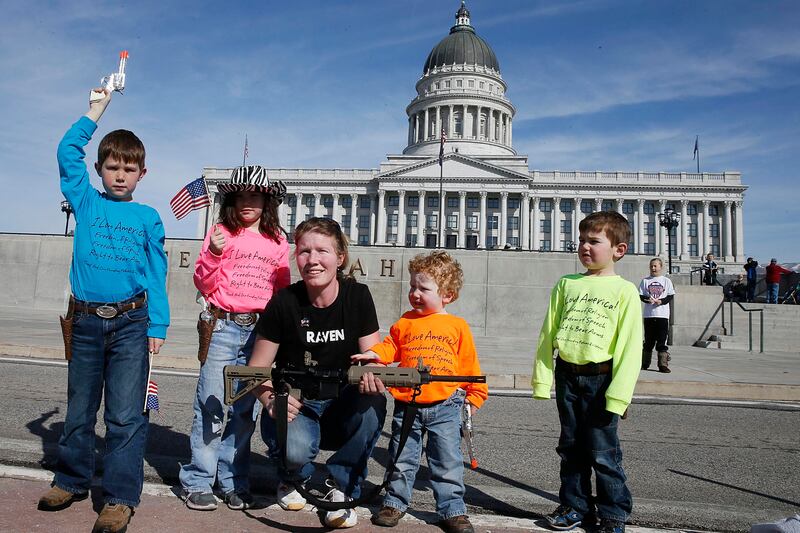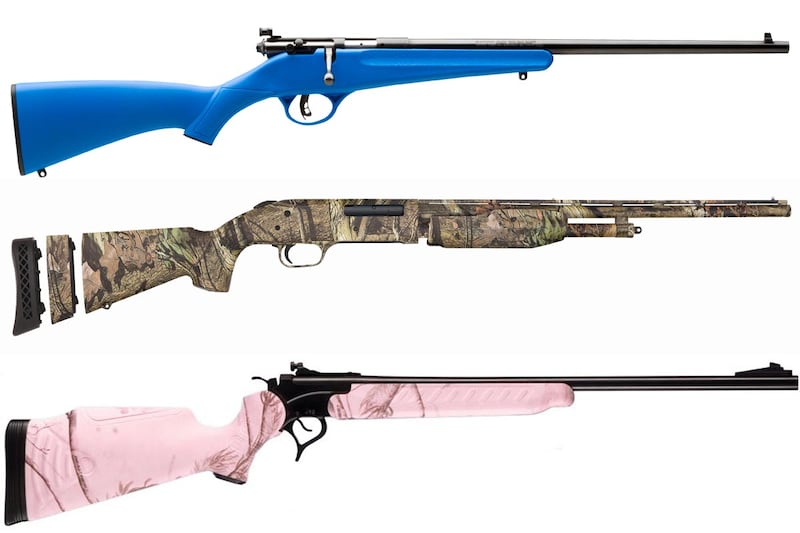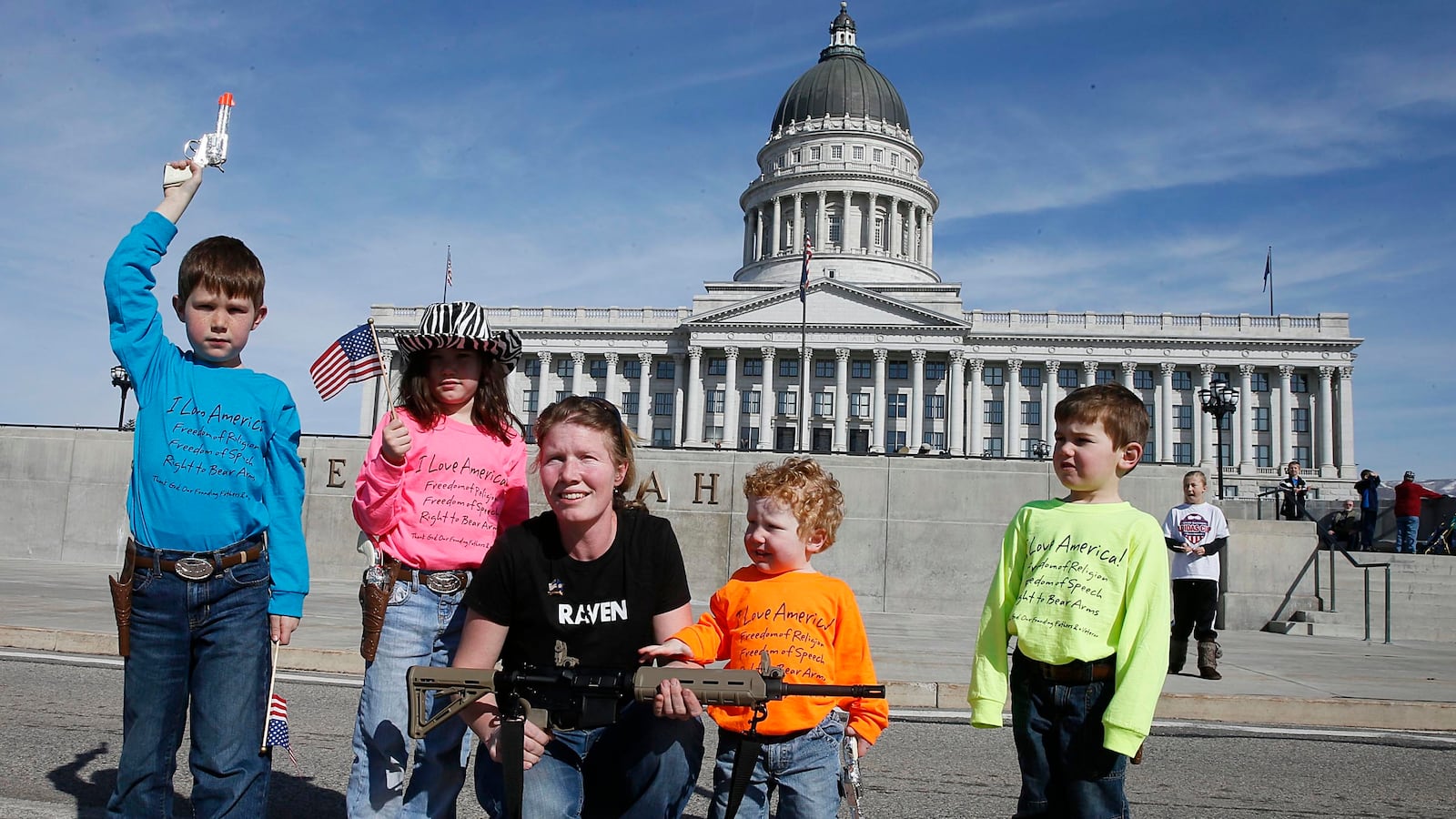Savage Arms, a Massachusetts-based gun manufacturer, sells the Rascal, a .22-caliber single-shot rifle touted for its ease of use. Thompson/Center, in New Hampshire, makes the Hot Shot, which comes in pink and, according to the marketing materials, “has all the features young shooters need and the cool looks of dad’s hunting gun.” Mossberg sells a mini .410 shotgun that enthusiasts like to call the Mighty Mouse.

The news that a 5-year-old had shot and killed his 2-year-old sister sparked a storm of outrage Wednesday, and much of the ire was directed at the fact that he used a .22-caliber rifle manufactured by Crickett, an arm of Keystone Sporting Arms that designs weapons specifically for children. The 5-year-old’s gun—which had been given to him as a birthday present—was marketed with the tagline “My first rifle.” Crickett’s website featured not just a friendly, cartoonish green insect as the company logo, but photos of young children cradling their weapons.
Weapons for youngsters have been an important and growing part of the firearms industry for several years, industry experts say.
Glenn Duncan, the owner of Duncan’s Outdoor Shop in Bay City, Michigan, says he has seen an uptick in sales to that market segment over the last 10 to 15 years.
“In almost every state, you can start hunting at any age. It’s the parents’ responsibility,” he says. “There are a lot of kids here who like to go shooting on weekends, who go out with the grandpa and parents and stuff, and then they start hearing about what their friends are doing.”
Duncan says long guns are so tailored to a child’s size specifications that they have become even easier for kids to use than BB guns or air rifles. And he attributes the renewed interest to the fact that more states are enacting laws to do away with age limits on firearms possession and hunting permits.
Policy experts on both sides of the gun-control debate were not able to confirm whether there’s a trend toward loosening hunting or gun-possession laws for minors; as it stands, those laws are nearly nonexistent.
According to the most recent data compiled by the National Conference of State Legislatures, few states have meaningful restrictions for children. In Oklahoma, for example, youths under age 16 can hunt alone for big game provided they’ve taken a hunter-education class. If they haven’t had the class, they are limited to small game. At age 10, kids can get hunting licenses in Idaho; in Missouri, children as young as 6 can hunt for “antlerless deer and turkey” so long as they are in the presence of a qualified adult. In New Jersey—where gun laws are considered strict—10-year-olds who have completed a course on gun safety can get a hunting license.
Mike Bazinet, a spokesman for the National Shooting Sports Foundation, declined to give a minimum age when he thought children should be exposed to firearms and said that decision was up to individual parents.
“It is really up to the family,” he says. “We are huge proponents of firearm safety.”

Gun enthusiasts say that the tragedy like the one in Kentucky is not an issue of guns for children, it is an issue of adults who are not securing guns safely. By their reckoning, whom the gun is for matters far less than how it is handled.
“I get asked all the time: ‘What is the right age?’” says Tom Gresham, the host of the radio show Gun Talk. “And the answer is always, ‘You know your child better than I do.’ I have seen 7-year-olds shooting shotguns in competition like pros. And we all know adults who shouldn’t even be driving.”
Proponents also point out that although the shooting in Kentucky put renewed attention on shotguns manufactured for children, weapons for kids have been around for about 100 years or so. Many adults recall firing off smaller shotguns in their days at summer camp, and 4-H and other youth organizations have promoted shooting sports for generations.
Even in the wake of this week’s shooting, curbing the gun market for kids is low on the priority list for gun-control advocates.
“You are not a bad person if you want to take your child hunting. You are a bad parent if you leave your gun accessible to a young child without supervision, or at least you are making a dangerous decision,” said Dan Gross, the president of the Brady Campaign to Prevent Gun Violence.
He too declined to give an age he believed to be too young to shoot firearms—“I honestly think that it should be up to the parents to be aware of the risks associated with it,” he said, adding that his organization is not pursuing legislation to curb youth gun ownership.
“To us, it is a question of how we focus our time and energy, and there is a much bigger opportunity around the idea of changing social norms around gun ownership.”





